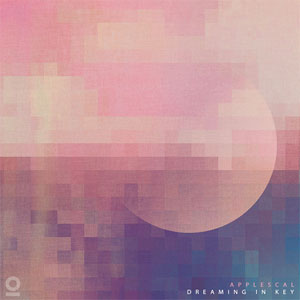Applescal Dreaming in Key
Applescal‘s debut and sophomore full-lengths came just eight months apart from each other, a fact […]

Applescal‘s debut and sophomore full-lengths came just eight months apart from each other, a fact that may have lent the impression that although the budding Dutch producer was obviously extremely talented, he may have spread himself a little thin during the earliest days of his career. Following the release of A Mishmash of Changing Moods (his second LP) in 2010, Applescal has stayed away from the full-length format, honing his craft in a somewhat quiet fashion across a number of EPs while simultaneously overseeing his own Atomnation label. As such, hopes are high for his newly completed third album, Dreaming in Key. In theory, the record has been given plenty of time to gestate; and so argubly represents the young beatmaker’s first extended artistic statement since his initial prolific burst.
An understandable gripe some had with Applescal’s first two albums was that although there were many quality efforts to be heard, their impact was dulled by the handful of extraneous and lackluster songs which also graced the tracklist. To a lesser extent, a similar complaint could be lodged about Dreaming in Key. The album’s 11 tracks add up to about an hour’s worth of music, and one can’t help but think that a more concise tracklist would have yielded a stronger release. Songs like opening cut “Boys” and “Thanks for the Fun” simply aren’t as engaging as the rest of the record, and although a “live” version of “El Diablo” (the original of which was released as part of the free El Diablo EP back in 2011) seems like a perfect closing effort with its balance of drive and contemplation, Applescal needlessly tacks on two more songs, “The Composer” and “Keep On Dreaming.”
Still, despite these few hiccups, Dreaming in Key is Applescal’s strongest outing to date. In many ways, his productions still sound like descendants of Border Community’s heyday; direct lines could be drawn from the synth-driven techno of James Holden or Nathan Fake to many of the tracks heard here. But this familiar style is just a touchstone from which Applescal builds his own brand of techno, one that’s fortified to today’s bass-heavy standards while somehow still being able to come across as both dreamy and driving. Songs like “Lonely People” and “On the Way” underpin blissful chords and hazy samples with thick rhythmic pilings aimed at the dancefloor, while “Onetasker” unravels a gorgeous arpeggio pattern over one of the album’s simpler—but no less effective—drum constructions. The album’s most intriguing efforts come just before the record is halfway through, with “Spring and Life” and “Vintage Clown/Shadow Hunters” making the best case for Applescal’s promise as an artist. Although they are placed back-to-back, they present quite different images of their creator’s production scope; the former infuses a base of mellow chords with an enticing procession of tuned percussion hits that eventually build and spin out of control, while the latter is perhaps the record’s most pop-aligned effort, combining funky chords and basslines with an infectious acid-tinged lead and the occasional vocal sample.
On the whole, Dreaming in Key mostly finds Applescal sounding like a producer who’s confident in his abilities. Despite a few moments where he slipped and comes across as an artist floundering his way through potentially good ideas, it’s hard not to feel hopeful about the young Dutchman’s future prospects. If Applescal can continue evolving while squeezing his talents into more efficient packages, Dreaming in Key will likely be seen down the road as an important stepping stone in his path to greater artistic achievements.

